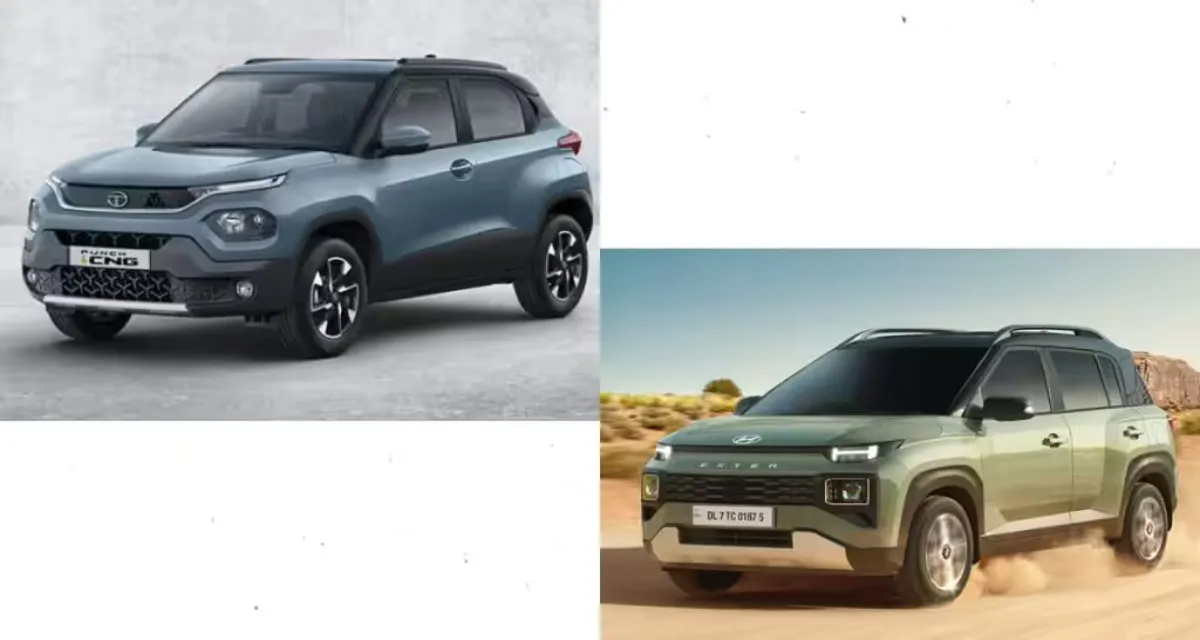
Hyundai Exter CNG vs Tata Punch CNG: Which car should you buy in 2024?

Hyundai Exter CNG vs Tata Punch CNG: Which car should you buy in 2024?
Over the past ten years India has seen shifting its focus to CNG Vehicles and undoubtedly among various options Tata Punch CNG was one of the first few CNG cars in India to get a new split-cylinder setup. The recently announced Exter is reportedly expected to follow in Punch’s footsteps and get the same split-cylinder technology as well as giving tough competition to Tata Punch CNG. Let’s delve into the comparison between both cars so that we can deliver a justified verdict for the same:
When it comes to price, the Hyundai Exter CNG ranges from Rs 8.50 lakh to Rs 9.38 lakh. On the other hand, the Tata Punch CNG is priced between Rs 7.23 lakh and Rs 9.85 lakh. This makes the base variant of the Exter CNG Rs 1.27 lakh more expensive than the Punch CNG. However, the top variant of the Punch CNG is pricier by Rs 47,000 compared to the top variant of the Exter CNG.
The dimensions of these cars are quite similar but with a few differences. The Tata Punch CNG is slightly longer at 3827 mm compared to the Hyundai Exter’s 3815 mm. The Punch is also wider by 32 mm, measuring 1742 mm in width. However, the Exter stands taller at 1631 mm and has a 5 mm longer wheelbase at 2450 mm.
Both cars are equipped with a 1.2-litre petrol-CNG engine. However, the Hyundai Exter CNG has a 4-cylinder engine, while the Tata Punch CNG comes with a 3-cylinder engine. In terms of power, the Punch CNG produces 73.5 PS and 103 Nm of torque, which is slightly more than the Exter’s 69 PS and 95 Nm of torque. Both models come with a 5-speed manual transmission and offer similar fuel efficiency, with the Exter claiming 27.1 km/kg and the Punch 26.49 km/kg.
The Hyundai Exter CNG is equipped with projector headlights, LED DRLs, 15-inch steel wheels, LED tail lights, and roof rails. It also has turn indicators on the ORVMs. The Tata Punch CNG, on the other hand, offers automatic projector headlights with a follow-me-home function, LED turn indicators on RVMs, 16-inch alloy wheels, LED tail lights, front fog lamps, and roof rails.
Inside, the Exter CNG features semi-leatherette seat upholstery, adjustable headrests for both front and rear passengers, a 12V power socket, and a rear parcel tray. The Punch CNG offers a sunroof, push-button start/stop, height-adjustable driver’s seat, electrically adjustable ORVMs, steering-mounted controls, central locking, power windows with driver-side one-touch down, front center armrest, and automatic AC. Both cars also include front USB type-C fast chargers and tilt steering wheels.
The Hyundai Exter CNG comes with an 8-inch infotainment system with four speakers, Android Auto, Apple CarPlay, and voice recognition. The Tata Punch CNG has a slightly smaller 7-inch system but offers six speakers along with Android Auto and Apple CarPlay.
Safety features in the Exter CNG include six airbags as standard, ABS with EBD, a tire pressure monitoring system (TPMS), electronic stability control (ESC), seatbelt reminders for all seats, a rear defogger, 3-point seatbelts for all passengers, hill start assist, a rear parking camera, rear parking sensors, and ISOFIX child seat anchors. The Punch CNG comes with dual front airbags, a reverse parking camera, rain-sensing wipers, an electronic stability program, ABS with EBD, rear parking sensors, and ISOFIX child seat anchorages.
Overall, Both the Hyundai Exter CNG and Tata Punch CNG come with a variety of features and similar powertrain options. The Tata Punch CNG offers more power and torque, and it has some advantages like automatic headlights, alloy wheels, rain-sensing wipers, and a push-button start/stop system. On the other hand, the Hyundai Exter CNG offers more premium features such as a larger infotainment system, six airbags, TPMS, and rear AC vents, although it is priced higher for the base variant. If you are looking for a more spacious and well-equipped micro-SUV, the Punch CNG might be your choice. However, if you prefer premium features and do not mind the higher price, the Exter CNG is worth considering.
Also Read: